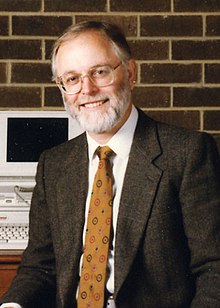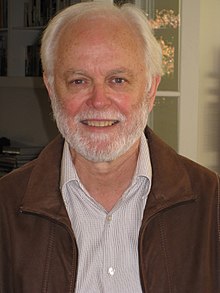Graeme Snooks

Graeme Donald Snooks (born 1944 in Perth, Western Australia) is a systems theorist and stratologist who has developed a general dynamic theory to explain complex living systems.[1] His resulting "dynamic-strategy theory" has been employed to analyse the fluctuating fortunes of life over the past 4,000 million years (myrs) and of human society over the past 2 myrs; to analyse contemporary economic problems (inflation,[2] financial crises,[3] climate change[4]); to explore socio-political issues (population expansion, the emergence of democracy, the "clash of civilizations"); to analyse the emergence, operation, and malfunction of the mind; and to make scientific predictions about the future.[5] New discoveries emerging from Snooks' publications include: existential schizophrenia, strategic frustration, strategic selection, the growth-inflation curve, the strategy function, the logological constant (akin to the cosmological constant), the Snooks–Panov Vertical, technological paradigm shifts, the Solar Revolution, and, most importantly, the strategic logos. His body of work challenges the existing paradigms of orthodox (neo-classical) economics, climate-mitigation economics, Marxism, neo-Darwinism, evolutionary psychology, self-organisation theory, and all other supply-side systems.
For twenty-one years, from 1989 to 2010, Graeme Snooks was the foundation Coghlan Research Professor of Economics in the Institute of Advanced Studies at the Australian National University. Currently he is the Executive Director of both the Institute of Global Dynamic Systems and IGDS Books[6] in Canberra. He was educated at Mount Lawley Senior High School (1957–1961), the University of Western Australia (BEc,1966; MEc, 1968), and the Australian National University (PhD, 1972). Professor Snooks has been elected Fellow of the Australian Academy of Social Sciences (1991), Fellow of the Royal Historical Society (UK) (1990), and Fellow of the Russian Academy of Humanities (2006).
Books and articles

Professor Snooks has published 29 books, including: Depression and Recovery (1974), Domesday Economy (with J. McDonald) (1986), Economics Without Time (1993), Historical Analysis in Economics (1993), Portrait of the Family within the Total Economy (1994), Was the Industrial Revolution Necessary?, (1994), The Dynamic Society (1996), The Ephemeral Civilization (1997), The Laws of History (1998), Longrun Dynamics (1998), Global Transition (1999), The Global Crisis Makers (2000), The Collapse of Darwinism (2003), The Selfcreating Mind (2006), The Coming Eclipse, or The Triumph of Climate Mitigation Over Solar Revolution (2010),[7] Dead God Rising. Religion and Science in the Universal Life-System (2010).,[8] , The Death of Zarathustra. Notes on Truth for the Risk-Taker (2011), Ark of the Sun: the improbable voyage of life (November 2015), Ultimate Reality & its Dissidents (March 2016), and Time's Gateway: a personal quest for ultimate reality (August 2017).
Articles on the theory of complex living systems have been published by Snooks in Advances in Space Research (2005), Complexity (the journal of the Santa Fe Institute) (2008), and Social Evolution & History(2002, 2005, 2007). Graeme Snooks' recent book, Ark of the Sun provides an overview of his thinking over five decades on the dynamics of life and human society and reveals the underlying reality of life - the strategic logos - which is the ultimate complex living system. Ultimate Reality & its Dissidents provides a unique philosophy of life based on his realist general dynamic theory. And Time's Gateway shows how these ideas emerged over the past fifty years. He is currently exploring the existential dangers of metaphysical systems of thought, and the corrective contribution of realist thinking. His latest (11 November 2016) article - The Triumph of Trump and the failure of the intellectuals - applies the dynamic-strategy theory to the recent US Presidential election (see Graeme Snooks, Researchgate) and provides suggestions for the type of dynamic strategy that the USA would need to pursue in order to "make America great again" and to position itself at the forefront of the forthcoming technological paradigm shift.
See also
References
Further reading
- For further details see [4]: together with Who's Who in Australia, and Marquis Who's Who in the World.
- Gary B. Magee, "As big as it gets: 'Big Theory' and The Collapse of Darwinism", in Social Evolution & History, vol. 5, no. 1, March 2006, pp. 164 – 174.
- Big History or Big Theory. Uncovering the Laws of Life Social Evolution & History. Vol. 4, no. 1, 2005. Special Issue. Exploring the Horizons of Big History
- Akop Nazaretyan, 'Snooks-Panov Vertical', The Encyclopaedia of Global Science, ed. I.I. Mazow and A.N. Chumakov, Moscow: Dialog Raduga Publishers, 2005.
- Complex systems scientists
- Living people
- 1944 births
- Australian economists
- Big History
- Non-Darwinian evolution
- People educated at Mount Lawley Senior High School
- People from Perth, Western Australia
- Scientists from Western Australia
- University of Western Australia alumni
- Australian National University alumni
- Fellows of the Academy of the Social Sciences in Australia
